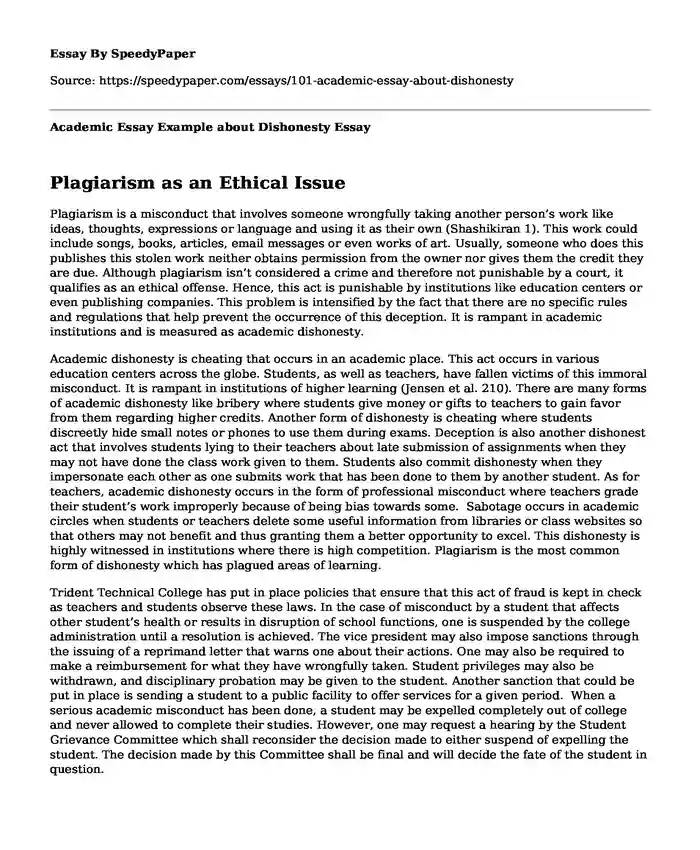Plagiarism as an Ethical Issue
Plagiarism is a misconduct that involves someone wrongfully taking another person’s work like ideas, thoughts, expressions or language and using it as their own (Shashikiran 1). This work could include songs, books, articles, email messages or even works of art. Usually, someone who does this publishes this stolen work neither obtains permission from the owner nor gives them the credit they are due. Although plagiarism isn’t considered a crime and therefore not punishable by a court, it qualifies as an ethical offense. Hence, this act is punishable by institutions like education centers or even publishing companies. This problem is intensified by the fact that there are no specific rules and regulations that help prevent the occurrence of this deception. It is rampant in academic institutions and is measured as academic dishonesty.
Academic dishonesty is cheating that occurs in an academic place. This act occurs in various education centers across the globe. Students, as well as teachers, have fallen victims of this immoral misconduct. It is rampant in institutions of higher learning (Jensen et al. 210). There are many forms of academic dishonesty like bribery where students give money or gifts to teachers to gain favor from them regarding higher credits. Another form of dishonesty is cheating where students discreetly hide small notes or phones to use them during exams. Deception is also another dishonest act that involves students lying to their teachers about late submission of assignments when they may not have done the class work given to them. Students also commit dishonesty when they impersonate each other as one submits work that has been done to them by another student. As for teachers, academic dishonesty occurs in the form of professional misconduct where teachers grade their student’s work improperly because of being bias towards some. Sabotage occurs in academic circles when students or teachers delete some useful information from libraries or class websites so that others may not benefit and thus granting them a better opportunity to excel. This dishonesty is highly witnessed in institutions where there is high competition. Plagiarism is the most common form of dishonesty which has plagued areas of learning.
Trident Technical College has put in place policies that ensure that this act of fraud is kept in check as teachers and students observe these laws. In the case of misconduct by a student that affects other student’s health or results in disruption of school functions, one is suspended by the college administration until a resolution is achieved. The vice president may also impose sanctions through the issuing of a reprimand letter that warns one about their actions. One may also be required to make a reimbursement for what they have wrongfully taken. Student privileges may also be withdrawn, and disciplinary probation may be given to the student. Another sanction that could be put in place is sending a student to a public facility to offer services for a given period. When a serious academic misconduct has been done, a student may be expelled completely out of college and never allowed to complete their studies. However, one may request a hearing by the Student Grievance Committee which shall reconsider the decision made to either suspend of expelling the student. The decision made by this Committee shall be final and will decide the fate of the student in question.
Academic Integrity Conclusion
In my opinion, integrity has been sidelined and dishonesty has escalated in this current generation leading to injustices in schools and workplaces. People aren't rewarded for the work they have done well but for what they don’t deserve. Society has pretended for long not to mind this but people should arise and speak against this act to bring justice and create a healthy working environment. If academic dishonesty is eradicated in our societies, there will be the correct use of talent people will be more creative. This change will result in rising levels of economic development.
Works Cited
Shashikiran, N. D. "Plagiarism and academic integrity." Journal of Indian Society of Pedodontics and Preventive Dentistry 32.1 (2014): 1.
Jensen, Lene Arnett, et al. "It's wrong, but everybody does it: Academic dishonesty among high school and college students." Contemporary Educational Psychology 27.2 (2002): 209-228.
Cite this page
Academic Essay Example about Dishonesty. (2018, May 04). Retrieved from https://speedypaper.net/essays/101-academic-essay-about-dishonesty
Request Removal
If you are the original author of this essay and no longer wish to have it published on the SpeedyPaper website, please click below to request its removal:
- Essay Example on How Conflicts Bring Out the Best and the Worst of Humanity
- Society's Reaction to Delinquent Behaviors, Free Essay on Juvenile Delinquency
- Free Essay on Social Media and Young Generation in American
- Free Essay Sample on Ethnomethodology
- Essay Sample Analyzing the Role of Mexican Women in 20th Century
- Essay Sample about Human Trafficking: Definition, Types, and Effects
- The Social Roots of School Shootings - Essay Sample
Popular categories





